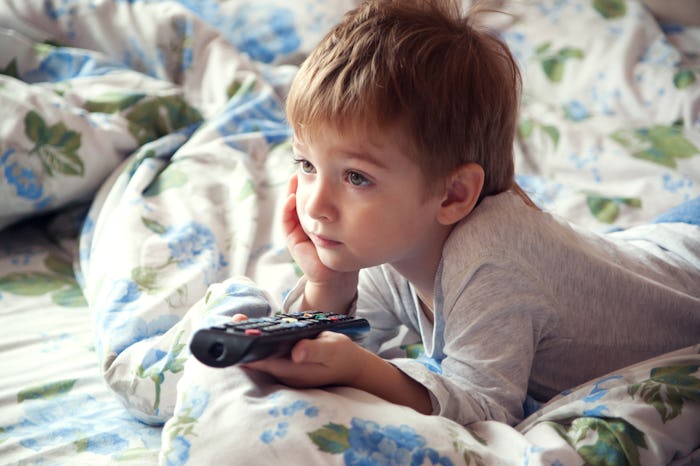Research has long shown that too much screen time can lead to unhealthy habits, but two new studies show that watching TV before bedtime might be specifically linked to childhood obesity and increased body mass index throughout their lives. It's actually a really vicious cycle. The first study comes from researchers at Penn State University, who surveyed parents about their kids' media habits.
Caitlyn Fuller, a medical student who recently published the study in Global Pediatrics Health, said in a press release that her team "saw technology before bed being associated with less sleep and higher BMIs." Her statement continued, "We also saw this technology use being associated with more fatigue in the morning, which circling back, is another risk factor for higher BMIs. So we’re seeing a loop pattern forming.”
So too much screen time before bed messes with your sleep cycle and then makes you groggier in the morning, then possibly making some bad choices for breakfast. According to Penn State News, the researchers asked over 200 parents of kids between the ages of 8 and 17 years old about their sleep and tech habits, like what they were doing before bed (texting, watching TV) and what devices they were doing it on.
They found that watching TV and movies was the one most linked to higher BMIs. Uh, oh.
It's not just the messed up sleep patterns, either. Another study, published in Pediatrics suggests that the well-known link between screen time length and obesity is not because of sleep or "mindless" snacking while they watch TV, but because of the messages the kids are getting while they watch.
It's well known that alcohol related content or sexual content on TV and in movies can normalize behavior, as Medical News Today reported, so why not obesity related content, too?
A different group of researchers had previously found that most children's movies contain stigmatizing and obesity-related messages, but also that "chilling out" in front of the TV and eating is the normal thing for people to do, thus reinforcing the behavior. While at the same time fat-shaming kids — talk about a crazy vicious cycle, right?
For the second study, the researchers analyzed over 30 movies and found that the messages kids received about food were pretty clear: Broccoli is bad, junk food is good, and heavier people are "stupid."
Medical News Today reported that the researchers found that "overweight and obese characters were consistently depicted negatively and were often portrayed as having lower intelligence. For instance, according to the raters in the study, Patrick from SpongeBob was "frequently depicted as being stupid and lazy."
Likewise, parents are seen force-feeding their kids veggies so much that the healthy foods were all perceived as "neutral or negative" and that less healthful foods were seen as a treat and reward, the site reported.
So, it's not entirely your fault if your kid cries every time you ask them to have a salad and skip the ice cream. Both studies also seem to be in line with the American Academy of Pediatrics' recommendations about how much screen time kids get.
For example, the group suggests parents use creative ways to limit screen time or at least keep it educational, like Sesame Street or other "quality" programming. The AAP wrote in 2016 that, "Parents can set expectations and boundaries to make sure their children's media experience is a positive one. The key is mindful use of media within a family."
The AAP also suggests that parents discuss screen time with older kids and work out a system that works for everyone, while also teaching them about the risks of too much screen time (like how it messes with sleep or can have other mental and physical health effects) so that they learn healthy habits.
Obviously, screen time is an important tool for parents, too. No one should feel bad about using it to help you get chores down or keep your kid occupied for a moment. But being aware of the risks, whether it be the messages they're taking in or that they aren't as active as they should be, can help you use screen time more wisely. Because who wants to give up a nighttime movie?
Check out Romper's new video series, Romper's Doula Diaries:
Watch full episodes of Romper's Doula Diaries on Facebook Watch.
